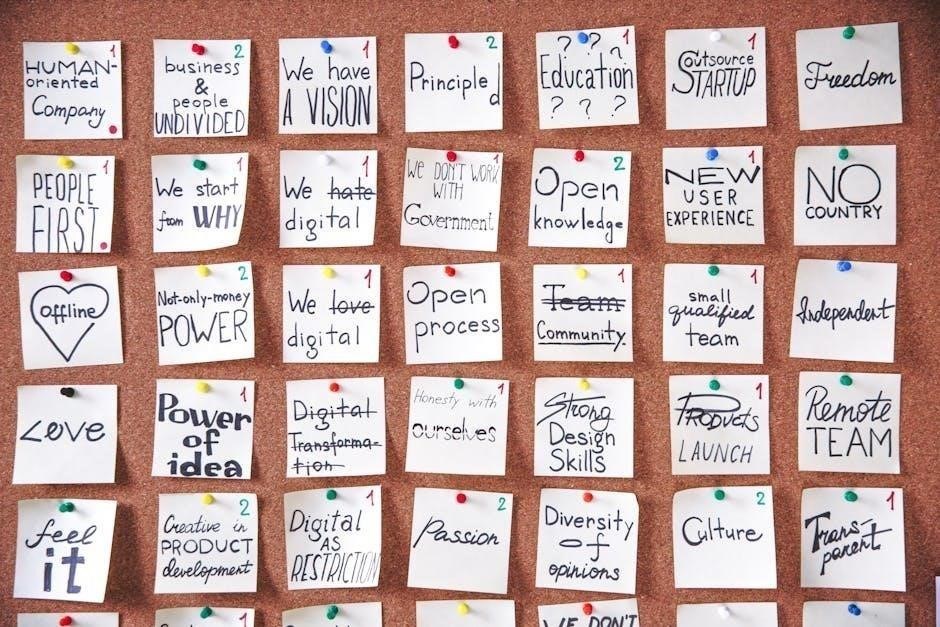Gender studies explore how society constructs and experiences gender, examining identity, roles, and inequalities. This field analyzes intersections of race, class, and sexuality, shaping modern sociological understanding.
Overview of Gender as a Sociological Concept
Gender, as explored in Lisa Wade and Myra Marx Ferree’s Gender: Ideas, Interactions, Institutions, is a socially constructed concept shaping identities and roles. It examines how societal norms, institutions, and interactions define masculinity and femininity, influencing inequalities. The third edition emphasizes intersectionality, highlighting how race, class, and sexuality intersect with gender to create diverse experiences. By analyzing these dynamics, the book provides a comprehensive understanding of gender’s role in society, emphasizing its fluidity and the impact of institutional structures on gendered outcomes. This sociological perspective underscores gender’s complexity and its evolution over time.
The Importance of Studying Gender in Society
Studying gender is crucial for understanding societal inequalities and promoting inclusivity. It reveals how gender shapes access to resources, opportunities, and power, impacting individuals and communities. By analyzing gendered experiences, we can address discrimination and advocate for equitable policies. The third edition of Wade and Ferree’s book emphasizes the need for intersectional approaches, highlighting how gender intersects with race, class, and sexuality. This knowledge empowers individuals to challenge stereotypes and fosters a more just society. Understanding gender’s role in shaping social interactions and institutions is essential for driving meaningful change and achieving true equality.
Key Concepts in “Gender: Ideas, Interactions, Institutions”
The book explores gender as a social construct, intersectionality, and institutional influences. It examines how gender shapes interactions and is reinforced by societal structures and norms.
Gender as a Social Construct
Gender is understood as a social construct, shaped by cultural norms, institutions, and interactions rather than biological determinism. Lisa Wade’s work emphasizes how societal expectations create gender roles, influencing behavior and identity. The third edition highlights the fluidity of gender, challenging binary frameworks and incorporating nonbinary and trans experiences. This perspective underscores how gender is performed and reinforced through social structures, media, and daily interactions. By examining gender as a construct, the book provides a critical lens to understand inequality and advocate for inclusivity, reflecting the evolving nature of gender in modern society.
Intersectionality and Its Role in Gender Studies
Intersectionality, a key concept in gender studies, examines how race, class, sexuality, and other identities intersect with gender to produce unique experiences of oppression and privilege. Wade and Ferree’s third edition emphasizes this framework, illustrating how overlapping systems of inequality shape individuals’ lives. By addressing these intersections, the book provides a nuanced understanding of gender, moving beyond single-axis analyses. This approach highlights the diversity of lived experiences, fostering a more inclusive and equitable sociological perspective, essential for addressing contemporary social issues and promoting justice.
Institutions and Their Impact on Gender Roles
Institutions and Their Impact on Gender Roles
Institutions, such as education, media, and the workplace, significantly shape gender roles by reinforcing societal norms and expectations. Wade and Ferree’s third edition highlights how these structures perpetuate gender inequalities, influencing individual behaviors and opportunities. For instance, workplace policies often reflect gendered assumptions about caregiving and leadership. The book explores how institutional practices, such as hiring biases and wage disparities, embed gendered power dynamics. By examining these systems, the text reveals how institutions can both uphold and challenge traditional gender roles, emphasizing the need for structural change to achieve gender equity and inclusivity in modern society.

About the Authors
Lisa Wade, a sociology professor at Occidental College, and Myra Marx Ferree, a leading gender studies expert, collaboratively authored this influential text, blending academic rigor with accessibility.
Lisa Wade: Background and Contributions to Sociology

Lisa Wade is an associate professor of sociology at Occidental College, known for her insightful research on gender, sexuality, and inequality. A prominent voice in public sociology, she frequently contributes to media outlets, making complex sociological concepts accessible. Wade’s work emphasizes the social construction of gender and its intersection with race, class, and sexuality. Her contributions to the field include challenging traditional narratives and advocating for inclusivity in academic discourse. As co-author of Gender: Ideas, Interactions, Institutions, she has significantly influenced gender studies, particularly through the book’s revised editions, which expand coverage of nonbinary and trans experiences.
Myra Marx Ferree: Expertise in Gender and Sociology
Myra Marx Ferree is a distinguished professor of sociology at the University of Wisconsin-Madison, specializing in gender, inequality, and social movements. Her research focuses on how institutions shape gender roles and disparities. Ferree’s collaborative work with Lisa Wade on Gender: Ideas, Interactions, Institutions underscores her commitment to intersectional analysis. She has significantly advanced sociological understanding by integrating global perspectives and advocating for inclusive methodologies. Her expertise bridges academic and public domains, enriching discussions on gender equity and systemic change, as reflected in the book’s third edition, which broadens its scope to include diverse gender experiences and identities.

Features of the Third Edition
- Revised for inclusivity, expanding coverage of nonbinary and trans experiences.
- Enhanced intersectional analysis to reflect diverse gender identities and societal impacts.
- Digital formats, including PDF, ensuring accessibility for modern learners.

Revisions for Inclusivity and Intersectionality

The third edition of Gender: Ideas, Interactions, Institutions has been extensively revised to enhance inclusivity and intersectionality. This includes expanded discussions on nonbinary and transgender experiences, ensuring a broader representation of gender diversity. The authors have integrated more nuanced analyses of how race, class, and sexuality intersect with gender, providing a more comprehensive understanding of societal inequalities. These revisions reflect the evolving nature of gender studies, making the text more accessible and relevant for contemporary students and scholars.
New Coverage of Nonbinary and Trans Experiences
The third edition introduces expanded coverage of nonbinary and transgender experiences, addressing their unique challenges and contributions to gender diversity. This addition provides deeper insights into the lived realities of these communities, fostering a more inclusive understanding of gender. By incorporating diverse perspectives, the text acknowledges the complexity of gender identities beyond traditional binaries, promoting empathy and awareness among readers. This new content reflects the authors’ commitment to representing the full spectrum of gender experiences in contemporary society.
Structure of the Book

The third edition is organized into chapters, each focusing on key themes in gender studies. Pedagogical features enhance accessibility and engagement, ensuring a comprehensive understanding of gender dynamics.
Chapter Overview and Key Themes
The third edition of Gender: Ideas, Interactions, Institutions is divided into chapters that systematically explore gender as a social construct, intersectionality, and institutional influences. Each chapter delves into specific themes, such as gender identity, power dynamics, and cultural representations, providing a nuanced understanding of gender in society. The book incorporates case studies, theoretical frameworks, and real-world examples to illustrate key concepts. Pedagogical features, including discussion questions and summaries, enhance learning. Revised chapters in the third edition emphasize inclusivity, with expanded coverage of nonbinary and trans experiences, ensuring a comprehensive and contemporary approach to gender studies.
pedagogical Features and Accessibility
Pedagogical Features and Accessibility
The third edition incorporates pedagogical features like summaries, discussion questions, and visual aids to enhance student engagement. Accessibility is prioritized, with a PDF edition ensuring compatibility across devices. The text is designed to be inclusive, addressing diverse learning needs and experiences, making it a valuable resource for both instructors and students in gender studies courses. These features collectively create a dynamic and accessible learning environment, fostering deeper understanding and critical thinking among readers.

Intersectionality in Gender Studies
Intersectionality examines how race, class, and gender intersect, shaping unique experiences of oppression and privilege, a concept central to modern gender studies and societal analysis.

How Intersectionality Shapes Gender Experiences
Intersectionality, a concept introduced by Kimberlé Crenshaw, reveals how overlapping identities like race, class, and sexuality influence gender experiences. In Gender: Ideas, Interactions, Institutions, Lisa Wade and Myra Marx Ferree explore how these intersections create unique forms of oppression and privilege. The third edition emphasizes lived experiences, showing how societal structures and institutions shape gendered realities differently for various groups. This approach provides a comprehensive understanding of how gender is not a standalone identity but is deeply intertwined with other social factors, highlighting the diversity of human experiences and fostering inclusivity in sociological analysis.
Impact and Reception of the Book
Gender: Ideas, Interactions, Institutions is widely acclaimed as a leading textbook in sociology, praised for its inclusive approach and comprehensive coverage of gender studies.
Academic and Student Reviews
The third edition of Gender: Ideas, Interactions, Institutions has received widespread acclaim for its inclusive and intersectional approach. Academics praise its revised content, particularly the expanded coverage of nonbinary and trans experiences, making it more representative of diverse gender identities. Students appreciate its accessible language and structured pedagogical features, which enhance understanding of complex sociological concepts. The book is hailed as a gold standard in gender studies, with many educators adopting it for its comprehensive and engaging exploration of gender dynamics. Its digital formats, including the PDF edition, have also been commended for their accessibility and convenience.
The Book’s Role in Sociology Curricula
Gender: Ideas, Interactions, Institutions has become a cornerstone in sociology curricula, widely adopted for its comprehensive and inclusive exploration of gender dynamics. Educators praise its structured approach, which aligns with course goals to foster critical thinking about gender identities, roles, and inequalities. The third edition’s revised content, including expanded coverage of nonbinary and trans experiences, ensures it remains relevant and engaging for modern students. Its accessibility in digital formats, such as the PDF edition, further enhances its utility in both traditional and online learning environments, solidifying its place as a key resource in sociology education.

Accessibility and Digital Formats
The third edition is available as a PDF, ensuring accessibility across devices. Its digital format supports inclusive learning, reaching a broader audience with ease and convenience.
PDF Edition and Digital Accessibility
The third edition of Gender: Ideas, Interactions, Institutions by Lisa Wade and Myra Marx Ferree is readily available in PDF format, enhancing accessibility for students and scholars. This digital version ensures that the text can be easily accessed on various devices, promoting inclusivity and flexibility in learning. The PDF format allows for features such as text search, highlighting, and note-taking, making it a practical choice for academic use. Additionally, the digital edition supports accessibility tools, enabling individuals with disabilities to engage with the content effectively. This modern approach to publishing aligns with the book’s emphasis on inclusivity and intersectionality, ensuring that its insights reach a diverse audience. By offering the book in a widely compatible digital format, the authors and publishers have made a significant step toward breaking down barriers to education and fostering a more equitable learning environment.
Gender: Ideas, Interactions, Institutions by Lisa Wade and Myra Marx Ferree remains a pivotal text in sociology, offering profound insights into gender dynamics and their societal impact.
The Significance of “Gender: Ideas, Interactions, Institutions” in Modern Sociology
Gender: Ideas, Interactions, Institutions stands as a cornerstone in modern sociology, offering a comprehensive analysis of gender dynamics. Its revised third edition emphasizes inclusivity and intersectionality, addressing nonbinary and trans experiences. By integrating diverse perspectives, the text bridges theory and real-world applications, making it indispensable for scholars and students. Its accessible format and digital availability enhance its reach, ensuring it remains a vital resource for understanding gender’s role in shaping societies. This book’s impact lies in its ability to foster critical thinking and empower future sociologists to address gender-related challenges effectively.